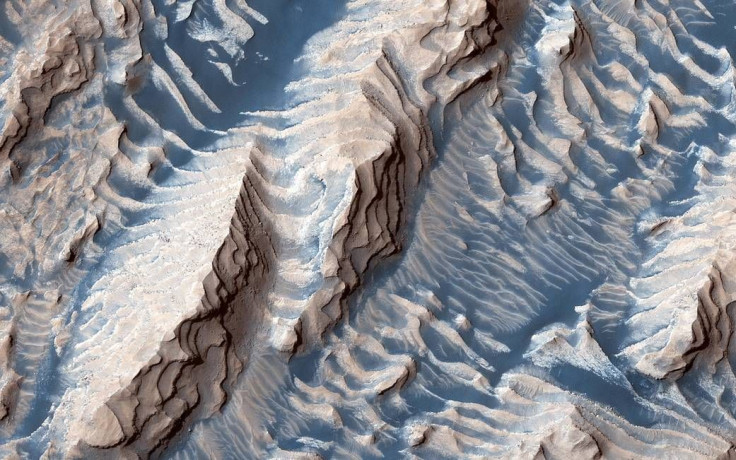NASA Photo Shows 'Airplane Crash' On Planet Mars, UFO Enthusiast Claims

An airplane propeller of a supposed aircraft which crashed on the surface of planet Mars is said to be the newest evidence of alien life on the planet.
According to Scott Waring, the infamous UFOlogist who has been posting various theories of extraterrestrial life on his website ETDatabase.com, he has stumbled on a NASA photo that clearly shows what looks like an airplane propeller on one of the regions of Planet Mars. In a post, Waring said that the propeller clearly chipped one of the cliffs of the Red Planet. He said, however, that the propeller is not part of some sort of Martian airplane but that it is the actual spacecraft itself.
“I found a crashed propeller-shaped UFO on Mars this week. The UFO has left a long crash trail behind it as proof from the direction it came. As the UFO fell slowly to land, it hit the edge of the rocky cliffs and broke the cliff,” Waring said in a video.
The alien theorist then proceeded to say that he has determined the trajectory of the UFO. “It slightly rotated and the tracks turn about 45 degrees then go straight to the UFO. The tracks are the same width as the UFO bottom,” he said.
Waring claimed that this is 100 percent evidence that it was the UFO that made the tracks on the Red Planet surface and that this is not the first time that he stumbled on the same propeller-shaped object.
“I once recorded a propeller UFO that turned like a wheel over my apartments here in Taiwan about six years ago. The UFO was about the size of a motorcycle and it rotated inside of a cloud. I had it on infrared video, however, back then I didn't know how to keep the resolution of the video and when I uploaded it to Youtube, the resolution dropped, so the UFO was almost impossible to see. It was already hard since it was just three propeller blades rotating slowly in the cloud-like an upright wheel, slowly rotating, churning the cloud. IR video recorders are the only way to get the hardcore evidence quickly that you want.”
Waring is quite famous for the objects he claims to have discovered and regards them as evidence of life outside of Earth. In his most recent post, he said that he saw remnants of an ancient head statue that looks similar to the Colossal Olmec heads discovered in Mexico, hinting the possibility that this “alien race” may have visited Earth as well.
© Copyright IBTimes 2024. All rights reserved.





















